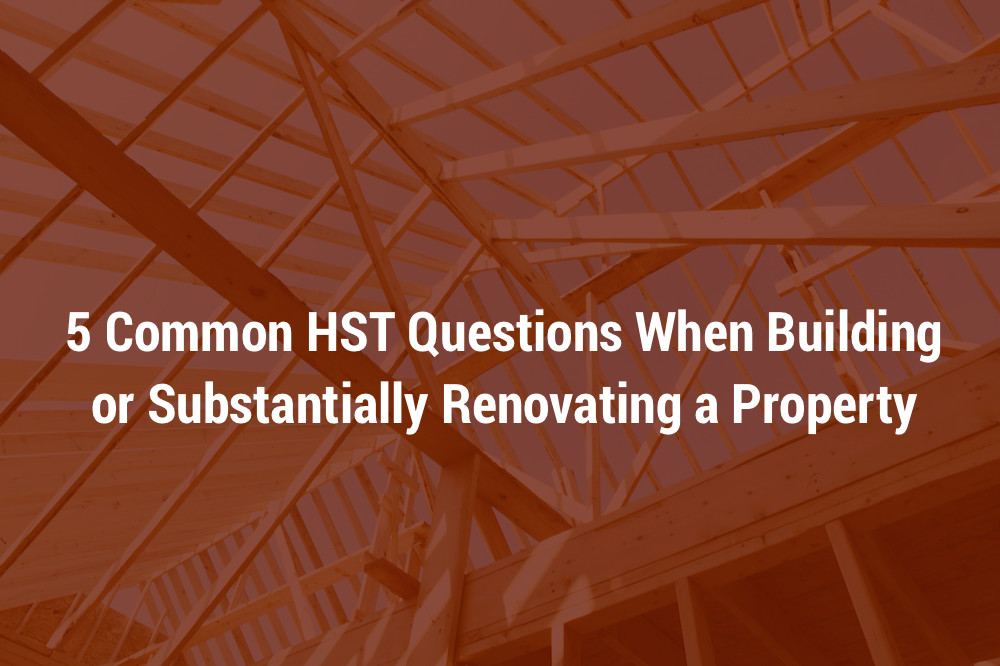How was your long weekend?

Victoria Day long weekend is always fun in our neighborhood. One of our neighbors organizes an annual fireworks event every year.
This year as a collective group, we spent over a thousand dollars on the fireworks.
It was an amazing show. Over a 100 people attended. I was amazed by the quality of the fireworks.
And I was amazed by how well my kids stayed asleep during the entire show, even though the fireworks were happening right outside of their windows. ?
Recently, I’ve got a few clients asking me about the HST impact on flipping properties after a renovation. It is different to opting for someone like Cascade Mountain Construction to start afresh when making you a home from scratch. It is a confusing area of the Excise Tax Act. Several interpretations were published by CRA on this topic.
Here’s the simple definition:
A builder is responsible to charge HST on a newly constructed and a substantially renovated home.
It’s never really simple when it comes down to Excise Tax Act or Income Tax Act. I’ve come up with a few common scenarios for our discussion.
Am I liable to pay for HST when I tear down the entire house, build a new one and resell it afterwards?
Yes, absolutely. If you purchase a house with the intention to flip, tear the old house down and build a brand new home, it is considered a newly constructed house and you are required to charge HST on it!
When you go through the standard RECO Offer to Purchase form, a standard clause would have been included forcing the buying agent to choose whether the sale price is inclusive or exclusive of HST.
Residential resale homes are generally HST exempted. Hence, the majority of the sale would state that the sales price is inclusive of HST.
When you build a new home after tearing down the old one, you are required to pay HST. More often than not, the sales price is also inclusive of HST.
What if I simply renovate a portion of the house? Am I required to charge HST?
That depends. If the renovation is not substantial, you are not required to charge HST.
“A substantial renovation is considered to have taken place where all or substantially all of the interior of a building, with the exception of certain structural components (the foundation, external walls, interior supporting walls, roof, floors and staircases), has been removed or replaced.” For example, changing the front door design and any interior doors does not count as a substantial renovation and so you won’t be required to charge HST. All or substantially all means 90% or more, calculated based on any reasonable method and basis, such as floor space, floor and wall space and number of rooms.
If you did substantially renovate a house (many investors use the term “gutted the entire house”), chances are, you are required to charge HST, which can eat into your profit.
But if you didn’t renovate substantially, you are still encouraged to keep proper evidence, before and after pictures/videos of renovation. This will come in handy if you ever get audited.
Is the housing rebate available if I build or substantially renovate a house that I sell immediately at completion?
Yes.
New Residential Housing Rebates are available for the builders to claim, if the buyers intend to move into the property and assign the rights to the builder to apply.
If the sale price is over $450,000, no GST rebate is available.
You would still be eligible to claim $24K of Ontario PST rebate back.
If the buyers intend to rent the residential property out, as a builder, you do not have the right to claim the New Residential Rental Housing Rebates back. The buyers would have to claim this back themselves after closing.
What is the HST implication if I build a home for myself or my relatives that move into the property at completion?
This can get real messy.
If you are building a house in the normal course of business or in an adventure in the nature of trade, you are required to do a self assessment at the time of completion.
Self assessment of HST is calculated at fair market value of the property at the time of completion.
It’s complicated, let’s use a simple example here.
You own a piece of land that allows you to build 4 detached homes and fully intend to sell them to a third party for a profit upon completion.
You start construction, claim HST paid on the acquisition of land, and all materials purchased.
Life circumstances change and you decide to move into one of the 4 homes.
In this case, you are REQUIRED to do a self assessment on HST at the time the house is substantially completed.
Another example here.
Same scenario as above, except that you always knew that you intended to move into one of these 4 houses.
You paid the HST and did not claim it back on ¼ of the land acquired.
You also did not claim any of the HST paid on the expenses incurred on your own house.
You move into the property and occupy the place as your primary residence.
In this case, you do not need to pay HST on fair market value of the property.
If you claim input tax credit on the purchase of materials & land, self-supply rules kick in and you need to pay HST at closing on your own property.
What is the HST implication if I build/substantially renovate a house and rent it out?
If you build or substantially renovate a house, rent it out for a couple of years, and sell it.
Self-assessment rule applies to you.
You are required to calculate your HST payable on the fair market value when the lease starts.
However, when you sell the property, HST does not apply as HST was already paid at the time the property was rented out as someone else’s residence.
HST impact in the construction industry can be quite complicated. Consult a professional to see if there’s any planning possibility so you don’t lose 13% of your profit to CRA.
Until next time, happy Canadian Real Estate Investing.
Cherry Chan, CPA, CA
Your Real Estate Accountant






Ari Yapoujian
If I purchase a pre construction condo from the builder and move in as a primary residence, do I qualify for HST rebate? purchase price is $453000.
Assuming I do, how long do I have to live in the unit before selling it?
Cherry
Hi Ari, you qualify to claim the new residential rebate if you truly live in the property and that you occupy the property as your primary residence. 🙂
There is no specific time period in the Income Tax Act. It is a matter of facts. Currently, CRA is going after anyone that does not own the property for over a year. This does not mean that they are not going after anyone that owns the property for more than a year.
Hopefully this helps.
Cherry
Molly
Hi Cherry,
If I buy a home and have substantial renovations done (as defined by the CRA), successfully claim the rebate, and then live in it for 5-10 years before I sell it, am I still liable to charge HST on that subsequent sale?
Cherry Chan, Real Estate Accountant
If you are doing substantial renovation, it is for self-use, no HST need to be charged upon sale after 5 to 10 years.
Steav Smith
Great article. I was looking for some information regarding this and finally got one. Thanks for sharing all the information with us. It was worth reading.
Sam
Hi Cherry!
I bought a house in Aug 2015 and moved in. While I was living in the house I have done side and top addition. Most of the exterior was kept from the original house and most of the interior was renovated. Due you to a death in the family and financial pressure I had to sell the house in Sep, 2016. I never charged HST or asked for any rebate. Do I still have pay HST on the sell? Thank you! Lot of useful information here.
Cherry Chan
Hi Sam, it seems like you may have a HST exposure. It is worthwhile to sit down with a specialist to learn more about your situation.
Cherry Chan
Hi Sam, it seems like you may have a HST exposure. It is worthwhile to sit down with a specialist to learn more about your situation.
Victor
Cherry,
Great article. Simple and easy to follow.
My wife and I have 2 kids and we purchased a house for my mother to move into as she would be assisting us to take care of our children.
We purchased the house for ~500k and put about ~80k into it. Based on the “substantial renovation” definition it may or may not qualify.
A few questions.
1. What do we have to do to prove to CRA that it was not a substantial renovation?
2. Cicrimstances changed and unfortunately my mother could not move as she had to assist another one of my siblings. This was unexpected and now we are putting the house on sale. When we sell are we going to be liable for HST/GST? I read above that if you are doing a substantial renovation for self use HST/GST does not apply, is this true and does this even apply to this situation?
3. I know this article is not intended for the principal residence exemption, however in my situation for the sale of the house intended for my mother. I am wondering if I will be able to reduce my capital gain. Do you have an article on this?
Kind Regards
Cherry Chan
I would recommend you to consult a professional in your situation.
Cherry Chan
1. Substantial renovation is based on a reasonable measuring basis – including work done in the area in relation to the house square footage.
2. If it is not substantial no HST is applicable.
3. Intention for primary residence exemption does not count. Primary residence exemption means you have to move in. You’re the owner, not your mother.
Anne
Hi Cherry,
We purchased a home and plan to sell it in 6 mos time for profit. We are putting in cosmetic updates on the exterior and interior. No major structural changes. Will we have to collect HST (in NB – 15%) and submit it?
Thank you
Cherry Chan
“A substantial renovation is considered to have taken place where all or substantially all of the interior of a building, with the exception of certain structural components (the foundation, external walls, interior supporting walls, roof, floors and staircases), has been removed or replaced.” Source.
All or substantially all means 90% or more, calculated based on any reasonable method and basis, such as floor space, floor and wall space and number of rooms.
If your “costmetic updates” is over 90% then you are required to charge HST on the sale. You can however claim the HST you paid on materials and labour.
Sue
Hi Cherry,
Would your answer change if the property was owned by a corporation instead of an individual? For example, there were minor improvements made to the home which did not constitute a substantial renovation. The property was previously occupied by a family before it was purchased by the corporation. The corporation’s intention was to purchase, make minor improvements (less than 90%) and then sell.
Aaron
Hi Cherry, I have been looking for an answer to this question as well. I am also doing a cosmetic flip here in NB. According to your answer, since the home has not been substantially renovated, I am not required to charge HST on the sale. However, if I don’t charge HST on the sale, does this mean that I can’t claim input tax credits such as tax on renovation material, legal fees, realtor fees etc.?
Thanks,
Aaron
Nader
Hi Cherry,
Great article! Is there a threshold on minimum years you should own the house so, it won’t be subject to HST once you sell it? In this case, what if you buy a property and you actually move in and in 2 years slowly slowly you renovate every room of the house inside out and you surpass that 90% threshold that you mentioned above. Would the sale of the house after 2 years be also subject to HST or because you moved in, it would qualify as principal residence? What if you live there 3 or 4 or 5 years? Would CRA still come after you for the HST?
Cherry Chan
Your situation is more complicated than a simple response that I can provide here.
You should seek professional advice.
Francine
Hi Cherry, I am currently undergoing a substantial renovation on a property I own and will be converting it into a duplex. I plan to occupy one of the units as my primary residence. Sadly, I became a statistic about a year ago when the original contractor took my substantial deposit and then declared bankruptcy. I was unable to recover any of the funds. I’m wondering whether this loss can be utilized in any way to offset capital gains on my taxes this year?
Cherry Chan
Your situation is more complicated than a simple response that I can provide here.
You should seek professional advice.
Mia M
Hi Cherry,
I bought a new house and planning to flip it. I paid HST to builder, except $24K deducted from the closing cost. I will posses this house for 1-2 months. Do I need to repay $24,000 back to builder or CRA?
Cherry Chan
Sounds like it. You likely will get a letter later on.
Zar
Hi Cherry,
When remitting HST on the sale of a newly built house as a flip (tear down), can the land acquisition cost be used as an income tax credit to reduce the amount of HST that needs to remitted to the CRA. I know I can claim all the HST associated with the construction cost but I am left with a large portion (land) that doesn’t have an HST component to it since resale residential properties (tear down bungalow) are exempt from HST during the transaction. So I effectively pay HST on the initial property purchase portion of the entire project for no reason.
Cherry Chan
If you didn’t pay any HST on your purchase, there’s nothing to claim.
Zar
In principle HST was paid to the property owner in the Agreement of Purchase & Sale, as the clause 7 states:
“HST: If the sale of the property (Real Property as described above) is subject to Harmonized Sales Tax (HST), then such tax shall be *included in* the Purchase Price. If the sale of the property is not subject to HST, Seller agrees to certify on or before closing, that the sale of the property is not subject to HST. Any HST on chattels, if applicable, is not included in the Purchase Price.
Cherry Chan
Residential resale is HST exemption. Hence no HST is paid.
Zar
So how should a infill builder approach this problem when flipping homes, the largest cost in the whole building process effectively has a phantom tax attached to every tear down house.
Cherry Chan
Hi Zar, I don’t disagree with you that HST can be the highest expense there. Technically speaking, you are supposed to charge HST when you sell the property. Recognizing the HST impact before you start the project is essential.
John
I purchased a home in 2012 and decided to tear it down and build a new home. Now that I’ve completed the build I’m under financial distress and need to sell the home. Although I lived in the home before tearing it down I haven’t lived in the new home yet. Do I have to pay HST when I sell it or does the buyer? If applicable, how is HST calculated on the new value of the home? For example, if I purchased the home for $380,0000 and now the new home I built is worth $1,200,000, how much HST is payable, if any? Thank you
Cherry Chan
Hi John, it’s difficult to provide professional advice based on limited information there. Based on the info provided, I would say that you still have HST exposure. Better to consult with someone who has experience to under the exposure better and explore the options available to minimize the exposure.
Anne
We are getting ready to sell our primary residence. In the last few years we rented out our small 2 car garage to a business for 700/month. The business was sold last year and we no longer rent out our garage. We are not HST registrants. Our municipal taxes are not commercial.
Will HST be payable on the sale of our property?
Cherry Chan
I doubt it but without looking at your situation in detail, it’s also difficult to advise. Be sure to consult a professional accountant before reporting.
NASEEM QADIR
If i buy old house, demolish and rebuild new house , can i claim HST on old house purchased
Cherry Chan
No HST is payable on the residential resale provided that it was substantially renovated immediately before sale.
Rhonda
if builder bought house , demolish it and rebuild, is he paying HST just on profit?
Cherry Chan
Rhonda, a builder building a new house is required to charge HST on the sale of the property. He can also claim HST he paid on hiring contractors and subcontractors for the build, reducing the balance payable at the end.
Nish
Hi Cherry, thanks for all your help and insights on this website you are doing a great job! Wanted to clarify something. If I buy an old bungalow in Ontario then substantially renovate it (90%) and sell it 3-4 months later to a 3rd party without ever moving into it myself or it being my primary residence, do I have to charge 13% HST on the full sale amount (ex. $1mill sale price = $130k HST to remit).
Is there any HST credit I can apply for on the initial purchase of the house? I know that I can claim the HST paid to contractors for construction etc but that might only amount to under $20k overall and I’ll still be left to pay $110k in HST out of pocket. Would this situation change if I were to set up a corporation and buy the house through there?
Cherry Chan
Nish, unfortunately the only HST credit I could think of is the amount you paid in your legal cost. It wouldn’t have changed if you setup a corporation.
Residential resale are not subject to HST. When you purchase your property, you don’t pay HST. Hence nothing can be claimed.
Nish
Hi Cherry thanks for the reply. So I don’t have to collect HST from the buyer of the house in this case?
qq8788 alternatif
Makasi, infonya sangat bermanfaat. Saya pembaca setia di blog ini.
Kontennya bener-bener joss…
link alternatif 18hoki
Admin, bisa lebih sering update artikel gak? kadang lama
banget nunggu update-nya. Padahal konten-kontenmu selalu bagus loh
apartment kitchen
It’s going to be end of mine day, but before finish I am
reading this great paragraph to increase my know-how.
Sandra Tang
We have a rental property for many years and with steady tenants. It is a semi-detached bungalow. In 2018, the neighhbour attached to us decided to add a second floor. Due to the age of the house and it was time to do some renovation, we also decided to add a second floor and did a major renovation to the main floor. The exterior structure and foundation remained intact. We were successful in obtaining the rebate. But CRA turned around and said we needed to pay GST (5%) on the fair market value. They didn’t send us assessment until early 2020 and said that we owed them the GST on the fair market value less the rebate, however interests were charged from 2018 plus penalty which is around $5.5K in total. When we claimed the rebate, we are not aware that we needed to pay GST on the renovation. We had no intention to sell. and the tenants were consistent. Our questions are:
1) Is CRA correct in charging GST?
2) Can we appeal to waive the interest and penalty?
3) when we eventually sell the property, do we have to pay HST again, at least the GST portion?
Thank you so much! If this is too complicated, we can consult you privately?